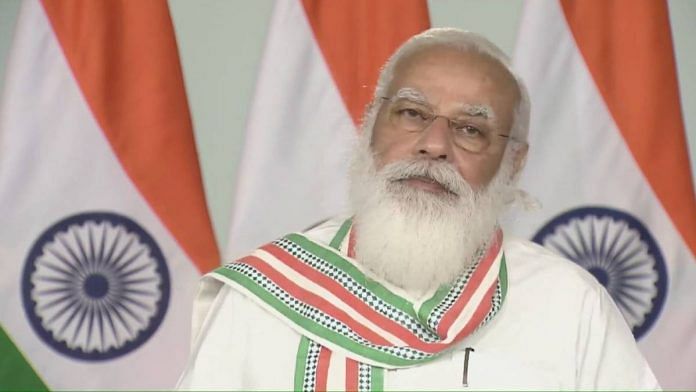New Delhi: The ‘Bhagidari’ or partnership model followed by the central government and states helped bring in public-friendly reforms in a short span of time amid the Covid pandemic, Prime Minister Narendra Modi said Tuesday.
In a LinkedIn post, the PM listed the various reform measures brought in by the states over the last one year after the Modi government linked the increase in borrowing limits, as demanded by states, to the completion of four reforms.
These reforms included seeding of the Aadhaar ID with all ration cards, easing compliance requirements for businesses, improving the health of municipalities, and replacing free power to farmers by direct benefit transfer (DBT).
As part of the Atmanirbhar Bharat package announced in May last year, the Modi government allowed states to increase their borrowing by two percentage points of GSDP. Of this, the additional borrowing of one percentage point was made conditional on the implementation of these four economic reforms.
“This nudge for reform is rare in Indian public finance. This was a nudge, incentivising the states to adopt progressive policies to avail additional funds. The results of this exercise are not only encouraging but also run contrary to the notion that there are limited takers for sound economic policies,” he said.
In all, 23 states have availed of additional borrowing of Rs 1.06 lakh crore, out of a total potential borrowing of Rs 2.14 lakh crore, he said, pointing out that these reforms would have taken years to implement if not for the incentive-based approach.
Also Read: Are states quietly adding ‘backlog’ to Covid death toll? Modi govt wants audit & analysis
The reforms initiated
For implementing the Modi government’s one-nation-one-ration-card policy, state governments had to ensure that all ration cards in their jurisdiction were seeded with the Aadhaar number of all family members and all fair price shops had electronic point-of-sale devices. Besides eliminating bogus ration cards, the initiative is also aimed at helping migrant workers access rations anywhere in the country, to avert the kind of crisis triggered by last year’s Covid lockdown.
Seventeen states completed this reform, Modi said.
To improve the ease of doing business, states had to make renewal of business-related licences under seven Acts automatic, online and non-discretionary. They also needed to implement a computerised random inspection system, and offer prior notices for inspection to reduce harassment and corruption under 12 Acts. Twenty states completed this reform, which would do away with Inspector Raj, he said.
Eleven states completed the task of notifying floor rates of property tax and of water and sewerage charges, aligning them with the current values and costs. This is expected to increase the revenues of municipalities and make them self-sufficient.
Six states implemented the politically challenging reform of offering DBT instead of free electricity to farmers, a system that saw cash transferred to the bank accounts of farmers who then made the electricity bill payments.
Modi said while the government was formulating its economic response to the Covid-19 pandemic, it wanted to ensure it doesn’t follow a “one-size-fits-all” model.
“For a federal country of continental dimensions, finding policy instruments at the national level to promote reforms by state governments is indeed challenging. But, we had faith in the robustness of our federal polity and we moved ahead in the spirit of Centre-state bhagidari,” he said.
The Covid-19 pandemic, Modi added, has posed policy-making challenges to governments and India is no exception.
“Raising enough resources for public welfare while ensuring sustainability is proving to be one of the biggest challenges,” he said.
(Edited by Sunanda Ranjan)
Also Read: Modi, state government, destiny. Survey asked Indians who they blame for Covid deaths



